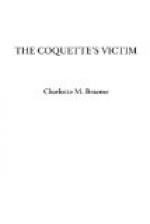He listened with a smile on his face, while the young man talked of something to do—some grand action to fill up his life, some heroic deed with which to crown himself.
“Utopian, Basil—all those are Utopian ideas. Progress is the order of the day.”
“Is there nothing?” asked Basil, “no way in which a man may distinguish himself after the fashion of the heroes of old?”
The colonel smiled sarcastically.
“My dear boy,” he said, “between ourselves, some of those heroes of yours were unmitigated ruffians, I hardly like to give utterance to such a sentiment, yet I believe it. You cannot defend a bridge after the fashion of Horatius—you cannot conquer worlds like Alexander. I fancy you will have to be content with being one of the best lords of the manor Rutsford has ever known.”
“You are sentimental, Basil,” he said to him one morning, “but not practical. A man is nothing unless he is practical. Why not give up all these foolish notions of being a great hero? Go down to Ulverston, build schools, almhouses, mechanics’ institutes and all that kind of thing. Marry and bring up your family to fear God and serve the queen. One ounce of such practice is worth all the theory in the world.”
But Basil could not see it—he longed for the unattainable, the ideal. What lay plainly before him was a matter of great indifference to him.
Colonel Mostyn, the keen, cynical man of the world, was, perhaps, the best companion he could have had. But the colonel had many anxious thoughts over him. At last an idea struck him.
“The finest thing that could happen to Basil would be a very decided flirtation with a beautiful, worldly woman, who would laugh him out of these fantastic ideas and make a modern man of him.”
So thought the colonel, and so has thought many a one before him, little dreaming of the danger of playing with fire.
But Basil did not seem to care much for ladies’ society. He went to two or three grand balls and pronounced them stupid, on hearing which, the colonel raised his eyes and hands in horror.
“A young man of twenty who finds a ball stupid is past hope,” he said.
There had been a great flutter in the dovecotes when it was known that Basil Carruthers, the heir of Ulverston, son of the great statesman, a young man whose income was quite twenty thousand per annum, besides the savings of a long minority, was in London—free, disengaged, and, as a matter of course, wanting a wife. Invitations literally poured in upon him—he accepted them at first, but soon grew tired.
“A tres dansantes at Lady Cecilia Gorton’s,” he said, holding out an invitation card at arm’s length. “Go, if you like, colonel. I do not care for it.”
The colonel was engrossed in the buttering of his roll, an operation which he always performed himself, but he was sufficiently astonished to pause in his proceedings and look at his nephew with a very horrified face.




